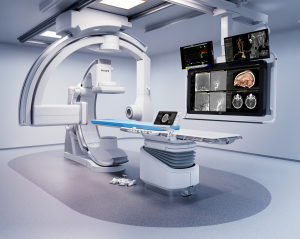por
John R. Fischer, Senior Reporter | February 27, 2024

Philips Azurion neuro biplane system
In the lead-up to the European Congress of Radiology annual meeting, Philips has debuted its new Azurion neuro biplane system, the latest iteration in its same-name brand of image-guided therapy systems that acts as a complete interventional solution for diagnosis, image guidance, and therapy assessment in stroke and other neurovascular patients.
The solution can switch between 2D and 3D imaging rapidly and is designed to speed up stroke diagnosis and treatment and for planning out more complex neurovascular procedures, including repairs for brain aneurysms and birth defects. It also comes with the company’s newest Neuro Suite software and services, including Philips’ ClarityIQ low-dose imaging and a range of neuro accessories and value-added services that add flexibility and control.
"With our current portfolio and biplane, we have a strong proposition for neuro procedures, due to outstanding usability and image quality. For stroke teams, effective collaboration and time are incredibly critical. Leveraging today’s technological advancements, we were able to design a new system that is even more flexible, faster and easier to use for the team to acutely treat those patients (in urgent need of a mechanical thrombectomy)," Nicole Hermkens, head of marketing for Philips image-guided therapy systems, told HCB News.



Ad Statistics
Times Displayed: 2620
Times Visited: 16 Fast-moving cardiac structures have a big impact on imaging. Fujifilm’s SCENARIA View premium performance CT brings solutions to address motion in Coronary CTA while delivering unique dose saving and workflow increasing benefits.
Among its new features are enhanced C-arm rotation, angulation, and parking facilities that allow rapid transitioning between 2D to 3D imaging. It also has a tableside control that eliminates the need to leave the sterile field, automatic beam rotation for more precise imaging from each angle and rotation, and a head immobilizer to improve stroke care.
Philips has also added complex AI algorithms to monitor performance and improve uptime in its angio suite solutions. This includes its ServiceHub remote connection services, which communicate, monitor, and proactively respond to potential service issues such as the likelihood of components failing at least seven days in advance.
Azurion systems are available in over 90 countries and have been used to treat more than 5.2 million patients. The design and workflow innovations of the new platform will be extended across Philips' entire Azurion portfolio.
"With the introduction of the new Azurion neuro biplane our customers can further increase the efficiency of neurovascular procedures while putting them a step closer to the ability to send patients with a suspected stroke directly to the Angio suite for fast diagnosis and treatment, saving valuable minutes and potentially improving clinical outcomes," said Hermkens.
In addition to the Azurion neuro biplane system, the company will also be discussing a potentially faster Direct-to-Angio-Suite (DTAS) pathway it is currently evaluating for diagnosing and treating stroke patients directly in the angio suite using cone-beam CT imaging.
Called WE-TRUST, the purpose is to reduce delays in treatment, which decreases the chances of a good outcome for patients, for those who have experienced a stroke in less than six hours. The multicenter clinical trial
has been underway since 2021 and will evaluate over 500 patients at 16 stroke sites in the U.S., Brazil, Argentina, the Netherlands, Germany, France, Spain, and Turkey, primarily on the Philips Azurion Image Guided Therapy System.
The new Azurion neuro biplane is available globally (as per local clearances).

